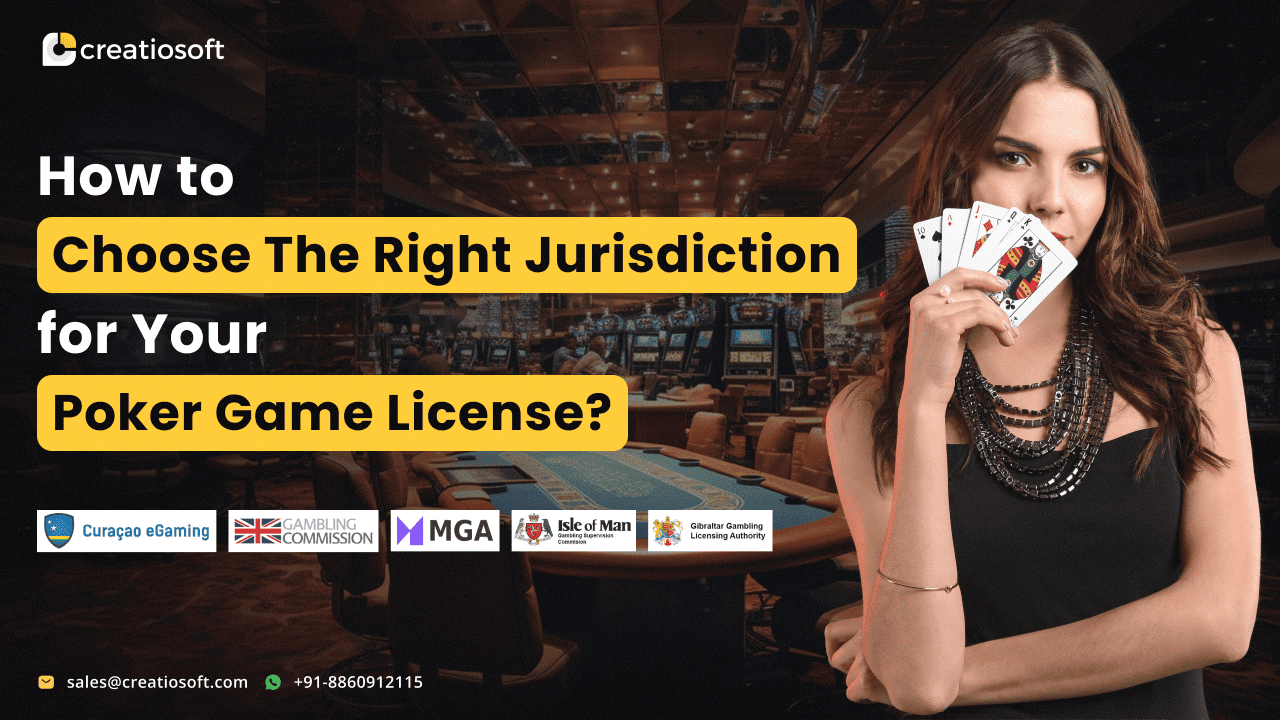While starting an online poker platform is one thing, how far you will go in this business will be significantly determined by the choice of jurisdiction to host your poker game license. Many aspects will be influenced by the chosen jurisdiction your credibility, tax payments, operational freedom, and ultimately, your positioning in the highly competitive online poker industry.
In this guide, we are going to break down the best jurisdictions for poker licenses, and help you decide on the perfect region for your business.
Why is Poker Licensing Jurisdiction So Important?
Poker licensing jurisdictions are not just a matter of legal formality regarding which jurisdiction to choose. It almost touches on every other part of your operations:
- Trust of Players & Credibility: If a jurisdiction licenses your business, it makes players feel safe to deposit their money on your platform.
- Taxation Benefits: If some regions offer low or zero corporate tax rates, one can save significant amounts on an annual basis.
- Compliance & Security: Stringent regulatory frameworks guarantee good working conditions without the intervention of legal impediments.
- Market Access: Some licenses open doors to specific regions where online poker is popular and highly profitable.
Top Poker Licensing Jurisdictions (2026)
Discover some of the best, reputable poker licensing jurisdictions in 2026 that have set the standards in this industry.
-
Malta Gaming Authority (MGA) — The Best of the Best
Why Choose It: Malta Gaming Authority is one of the most respected jurisdictions in the iGaming industry for licensing. A license on your platform from the MGA will boost credibility, prompting player trust worldwide.
Key Benefits:
- Complete access to the European market
- Excellent player protection and responsible gaming policies
- Attractive corporate tax rates
- Booming iGaming ecosystem and broad business support network
Best suited for: Platforms targeting European poker players who seek credibility and compliance.
-
UK Gambling Commission (UKGC) — The Most Trusted Globally
Why Choose It: The UKGC is recognized as one of the most stringent regulators globally, conducting multiple audits annually and maintaining exceptionally high operational transparency. If you want absolute topmost credibility for your platform and also access to the UK poker market, there can only be one license.
Key Benefits:
- Reputation for the best standards in the world, also widely trusted by the players
- Mandatory responsible gaming frameworks
- Strong dispute resolutions and marketing regulations
Best For: This one is for poker operators targeting UK-based players who would seek a license recognized worldwide.
-
Gibraltar Gambling License — Trusted by Big Brands
Why Choose It: Gibraltar has long been the domicile of many major online poker brands. It is known for a robustly regulated market with a good and established reputation.
Key Benefits:
- Low corporate tax rates
- Very secure and transparent regulatory environment
- Easy scaling opportunity worldwide
- Simplified access to UK and EU markets
Best For: Established poker operators eyeing the global market prize.
-
Isle of Man Gambling Supervision Commission — Premium & Prestigious
What Sets It Apart: This reputation is heavily influenced by the Isle of Man, with its stringent compliance standards and a fiercely regulatory environment for players.
Key Benefits:
- Globally respected
- Tax-friendly environment (0.1% to 1.5%)
- Mandatory secure hosting
- Access to both high-value European and Asian markets
Best For: Poker platforms that want elite licensing and long-term stability.
-
Curacao eGaming License — Budget-Friendly & Quick
Why Choose It: Some of the most affordable and straightforward poker licensing is currently available online through Curacao. As such, it is very well-suited to start-ups and early-stage operators taking their first steps into the online space.
Key Benefits:
-
- Very cheap licensing
- The application process is relatively fast: usually two to six weeks
- They support platforms developed using cryptocurrencies
- It allows for the propagation of several gaming verticals under one license
Ideal for: New poker platforms that require a reasonably-priced, crypto-friendly licensing solution.
Cost and Timeline Breakdown to Obtain Poker License
| Jurisdiction | Initial Cost | Renewal/Annual Fee | Timeline to Approval | Tax/GGR Rate |
| Malta (MGA) | €5,000 application + €25,000 B2C license (Type 1-3), or €10,000 (Type 4) | €25,000 (or €10,000); compliance contribution can reach up to €600,000 | ~12–16 weeks | ~5% on Malta-based GGR; corporate tax ~35% |
| UKGC | £30,000–50,000 | £30,000–50,000/year or varies by revenue | ~8–12 months | 15–21%; corporate tax ~19–25% |
| Gibraltor | ~$21,000–$26,000 | ~$15,000/year | 4–6 weeks | ~0%; corporate tax ~2% |
| Isle of Man | £35,000 (application) | ~£35,000/year; gaming duty 0.1–1.5% GGY | 10–14 weeks | 0% corporate; gaming duty 0.1–1.5% |
| Curacao | ~$21,000–$26,000 | ~$15,000/year | 4–6 weeks | ~0%; corporate tax ~2% |
Note: Compliance contributions to the MGA in Malta are based on revenue and may exceed €500,000 for high-revenue operators.
How Can You Choose the Perfect Jurisdiction for a Poker License?
These are the few significant factors that should be considered before determining the jurisdiction for licensing:
-
Market Access
Where are your desired players situated? The jurisdiction must permit you to operate legally in these regions.
-
Cost and Taxation
License fees typically start at around $10,000 and can range up to $50,000 or more, depending on the jurisdiction. Compare the tax rates between corporations—some jurisdictions offer a 0% benefit.
-
Regulatory Requirements
Some of the authorities insist on strict compliance, really tough financial audits, and strong KYC policies. Decide if you want a quick approval process or top-tier credibility.
-
Reputation & Player Trust
Licensing in a respected jurisdiction significantly enhances the brand’s credibility. Players prefer platforms regulated by well-known authorities, such as the MGA or the Gibraltar Gambling Commission.
The Steps to Take to Get an Online Poker License
Here are seven things you can do to make the process of licensing an online poker site a bit easier:
- Research the Best Jurisdiction for Poker License: Fee comparison, tax comparison, regulatory requirements.
- Prepare Legal Documentation: Business registration documents
- Evidence of financial solvency: AML & KYC policy
- Application submission: You will need to submit all the required documents to the licensing authority.
- Compliance & Audits: Background checks and technical audits.
- Obtain the License: The time has come, and now you can legally commence operations of your poker platform once the approval has been granted.
Read in detail: Steps to Get a Poker License
Pro Tips for a Smooth Licensing Journey
- Hire a Gaming Consultant: Saves time and avoids legal pitfalls.
- Go Crypto-Friendly: Go for jurisdictions that allow blockchain-based poker transactions.
- Security for Players: First, establish your poker business in a jurisdiction with strict AML and data protection laws.
- Long-Term: Take a jurisdiction that has the capacity to scale up with your business.
Final Thoughts: Putting It All Together
Selecting the best jurisdiction for a poker license is one of the most critical decisions in the final setup of an online poker website. Depending on the target place you desire in the poker market, it is essential to pay close attention to jurisdictions that particularly suit the target audience and future steps.
Success in the rapidly growing iGaming industry hinges on more than just launching your poker platform. It is about earning long-term credibility and compliance. By selecting the proper poker licensing jurisdiction that resonates perfectly with your business model and audience, you enable your platform for sustainable growth and a competitive edge.
Remember: A proper license doesn’t just make you legally compliant; it also establishes your trustworthiness.









